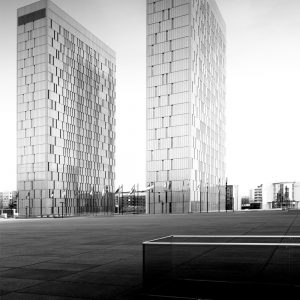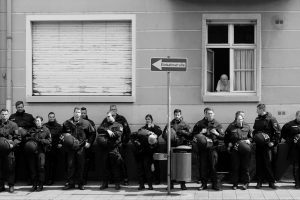
September 11th, 2019, 14:56 pm
Stand the truth, AfD!!
I was expecting glowing landscapes. It was said that the East burned for Right. Saxony election! I was prepared for everything. Depending on the outcome of the election there would be riots from the left or riots from the right. Burning barricades, water cannons! Really? Still on Saturday before the election on September 01, 2019, officials of the Saxon state parliament confirm this estimate. For this reason, the addresses of the election celebrations of the parties (then) represented in the Saxon Landtag would be kept secret.
“What you dare”, friends had told me before my departure. I didn’t trust my western ears anymore. I urgently had to examine my indirect perception of East Germany. Are there really differences in democracy and friendliness between the two Germanies? Does the poison of the right-wing populists from Pegida to AfD make the German East evil, just as Salvini made Italy a dark place? Are there two Germanies at all?
From the beginning
On my way to Dresden Chemnitz was a warm up. Here the right-wing extremistic group Pro Chemnitz, observed by Saxony’s Office for the Protection of the Constitution, had announced a march for the Friday before the election, followed by a rally. In the autumn of last year, the unification had attracted thousands with its Friday demonstrations. We remember that some rabbits were not allowed to go there. Later that year, the number of participants dropped significantly to around 100.

Also on this Friday the number of participants is approximately about 140. From the edge of the meeting place of the event at Chemnitzer Neumarkt, coffee house guests looked amused at the German-flag-wavers who chanted the usual slogans: “Fake news”, “The system`s down, we are the turning point”. When the right-wingers formed up for their march accompanied by the police and carried their “we are the people banner” in front of them, the chants became more hostile. Beside the classic, “Merkel must go”, demands like “Who does not love Germany should leave Germany” and “Criminal foreigners out” could be heard.
While residents of Chemnitz were still between amused and annoyed by the small group of rights, “Who are they? – “Pro Chemnitz.” – The right? Ahh, they’re running behind the police again”, chants like this were heard: “Merkel stole the land, give it back. Otherwise the Saxon will get you, with the air rifle”. What sounds borderline extreme and inhuman is, according to the Saxon constitutional court, covered by the right to freedom of expression.
The encounters with locals, which I had during my four days in Saxony, were very charming, warm-hearted and funny. Sure, it sounds very naïve, but I paid close attention to how women with headscarves or colored people move in the streets of Chemnitz and Dresden. Especially in the vicinity of right-wing rallies. I would like to hold back with an evaluation here that sociologists or human rights activists would rightly consider to be too subjective, too unscientific and anyway far too small in terms of time and geography. But the normality and similarity with my western reality reassured and pacified me. Saxony is not Dark-Germany after all! Because that was my hysterical fear. Very subjective, as I said.
My new assessment also includes many other first impressions I had. When I work on such and similar reports, I get to know the unknown by bike. It allows me to react faster, to ask questions, to look and to go. It gives me the feeling of being able to change faster when I’m wrong, but also of being able to dive deeper quickly when something seems interesting. So I cycled a lot in Chemnitz and Dresden. It struck me that, apart from the individual accents as historical places they are, the surfaces of the cities do not differ in any way from the phenotypes of West German metropolises. The same labels are flashing on the facades, there are people with tattoos here, fathers are pushing pushchairs, the beards of the bike messangers are bending in the wind, a lot of ice is being snapped and a some Turks are haggling at the corner. McDonalds has no WutBurger in the east either.

It is obvious that a lot has been planned and invested here. The polished surface doesn’t look like painted to me, but designed, arrived, self-determined! It would be interesting to hear whether East Germans are aware that, thirty years after reunification, their habitats no longer seem to differ from those in the West. The asphalt is so smooth, the coffee smells so Italian and the trees are as green as in the West.
Some things seemed to be a bit cheaper to me in Cemnitz and Dresden. A look at the web comparing prices of everyday services reveals that. A comparable public transport weekly ticket costs € 26.30 in Cologne for an adult and € 21.90 in Dresden. The entrance fee for a person at the public swimming in Dresden is 20ct cheaper than in Karlsruhe. An overnight stay in a Motel One branch in Hamburg from 13 to 14 September costs € 122,21. For comparison: In Dresden the same night costs € 73.14. Rentals for living space of the same size are cheaper in comparable areas between 200 and 500 euros / month.
If it is true that the different qualities of life between East and West Germany have equalized 30 years after the fall of communism, who will profit from the refrain-like persistence with which the AfD and many other right-wing extremist groups vehemently and aggressively repeat the idea of a German two-class society? Except the neo-Nazis themselves. Does the AfD not keep the long time obsolete East-West debate going with the intention of serving the cliché of the limited Ossi? Without the powerful and much appreciated appearance of all the right-wing neo-fascist groups in East Germany and the poison of simplifications and backwardness, the East would not be so irritated looked at from the West. Very subtly, right-wing populist currents generate a retrospective self-fulfilling prophecy. By exactly (stereo-) typifying the West’s imagination of the underdeveloped and right-wing radical East, AfD&Co correspond to the West’s assumed attitude to the East from the past, today in detail.

All eyes open, Saxony: The AfD makes you look stupid in the West because you run after them. To you they sell the West as arrogant and we would shake you off. Yet the West itself knows many of the supposedly specific Eastern problems well. Not only the German West – all highly developed industrial countries are struggling with demographic change, which directly leads to pension financing problems in the affected regions. The structural change, which is accelerating the reduction of industrial jobs and at the same time leading us to expect an increase in digitised labour, is not only affecting Lusatia. The same applies to the fact that within the framework of globalised production processes, work is immediately being completely shifted to other continents. And climate change does not stop at Kassel. However, there is one major problem that is abundantly clear in eastern Germany and that only the east itself can solve: The much smaller density of companies. At a time when companies are also dependent on foreign specialists, skilled workers or immigrant apprentices, it is not to be expected that a new company headquarters will be set up where xenophobia and racism are suspected. Even if East Germany is basically not racist, it is presumed to be where AfD is elected in large numbers.
Courage to the truth, AfD! You are not part of the solution.
A little more than every fourth voter in Saxony would probably contradict to this sentence. Surveys after the election showed, however, that of the 27.5 percent of AfD voters in Saxony, a considerable proportion are protest voters. Anyway it must be doubted that this form of protest will give constructive contributions to improving the conditions against which it is directed.

At exactly 6 p.m. on the election evening Beatrix von Storch, Jörg Urban and Jörg Meuthen performed their jubilant choreography to the assembled press, which however was surely being rehearsed to be performed with more passion. In view of the sub 30 result, the celebration got stuck with an ecstatic “Okay, done”. The fact that the AfD had remained below its own expectations on the one hand, and below the fears of all other parties and the Activists from the Left on the other hand, has considerably eased the security situation around the Saxon Landtag. Apart from a few representatives of the party DIE PARTEI and about 50 young Fridays-for-Future people, who showed up in front of the Parliament after sunset, no relevant incidents were reported.
So I took my bike in the warm evening rain of an exciting election Sunday and crossed the Elbe on the Augustus Bridge to the edge of Inner Neustadt, where my Bulli awaited me in a small town forest on the meadows of the Elbe. I had four great days in the German East. Rarely before was it more conscious to me that thirty years ago two Germanies were revolted by the strength and the will of thousands from the East to a very diverse unity and a great, colorful Germany.
From the downtown Dresden on the other side of the Elbe the wind pushed this hit of the Left over to me and sang me into a content sleep. “AfD, Faschistenpack, wir haben Euch zum Kotzen satt!!”







